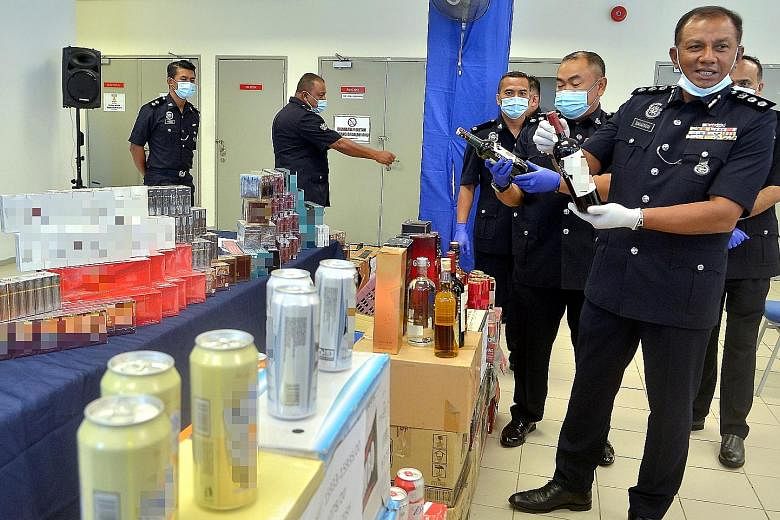A new rule banning the sale of liquor at certain types of grocers in Kuala Lumpur from next year has ignited a debate on the liberties and rights enjoyed by non-Muslims, who make up more than one-third of Malaysia's population.
Kuala Lumpur City Hall (DBKL) last week announced new guidelines for liquor licences in the capital, in which sundry shops, convenience stores and Chinese medicine stores are banned from selling hard liquor on their premises beginning on Oct 1.
The hours stipulated for selling beer on these premises will also be shortened, and will be until only 9pm every day. Hypermarkets, supermarkets, restaurants and pubs are allowed to sell liquor within their existing operating hours.
Opposition lawmakers and civil society members have described the ban as a violation of non-Muslims' freedom to practise their culture, which is provided for by the Federal Constitution.
The Kuala Lumpur chapter of the opposition Democratic Action Party (DAP) last week asked for the ban to be rescinded, pointing out that the current business operating model at sundry shops has been in place for more than 50 years.
"We will arrange a meeting with the mayor and demand DBKL retract this unfair and unreasonable ruling," DAP's KL chief Tan Kok Wai said in a statement in Mandarin, adding that the party will gather views and objections from relevant stakeholders.
Selangor and Kuala Lumpur Wine and Spirit Chinese Dealers Association secretary Albert Chooi, in a report in Free Malaysia Today, estimated that the ruling would affect some 300 sundry shops, medicine shops and convenience stores.
The ruling has also come up against strong opposition from military veterans, especially after Deputy Religious Affairs Minister Ahmad Marzuk Shaary, a member of the Islamic party PAS, suggested the liquor ban could be extended beyond Kuala Lumpur to other states.
Military veterans group Persatuan Patriot Kebangsaan (Patriot) president Brigadier-General Mohamed Arshad Raji called the move "unnecessary and ridiculous".
"If curbing of liquor sales is because of drink driving, there are better ways to tackle the problem," Datuk Arshad said in a statement on Sunday, adding that any decision should include consultation with the business community.
Former Malaysian army chief General Hashim Mohd Ali, president of the Chiefs Circle, which is made up of retired army chiefs, also criticised the move, saying there are no studies linking liquor sales in such outlets to the drink driving incidents in the country.
"The last thing our economy needs in this or the post-pandemic period is further curbs on legitimate business activities," Tan Sri Hashim said in a statement.
Mr Hanipa Maidin, an opposition lawmaker from Parti Amanah Negara and a former deputy minister, labelled the move as unconstitutional. "Such a total prohibition would definitely have a tremendous effect of rendering the exercise of non-Muslims' right to practise their own religion as a mockery and illusory. Hence, it is unconstitutional. Period," Mr Hanipa said in a statement.
City Hall previously froze the issuance of new liquor licences pending new licence regulations, following a rise in drink driving accidents in Malaysia this year. This had already led to stiffer penalties for drink driving.
Federal Territories Minister Annuar Musa, who previously cited drink driving incidents as reasons to freeze the liquor licences, defended the move as "not unusual", citing restrictions in selling liquor in several European countries as well as in Singapore.
Tan Sri Annuar said the move is designed to regulate the sale of liquor following public complaints that illegal liquor and liquor in small packets are being sold in some sundry shops and mini market chains.
"There are also those who sell liquor to minors and school students as it is easily available everywhere," national news agency Bernama reported him as saying.
The government recently amended federal laws to include mandatory jail sentences for drunk drivers who cause deaths.

